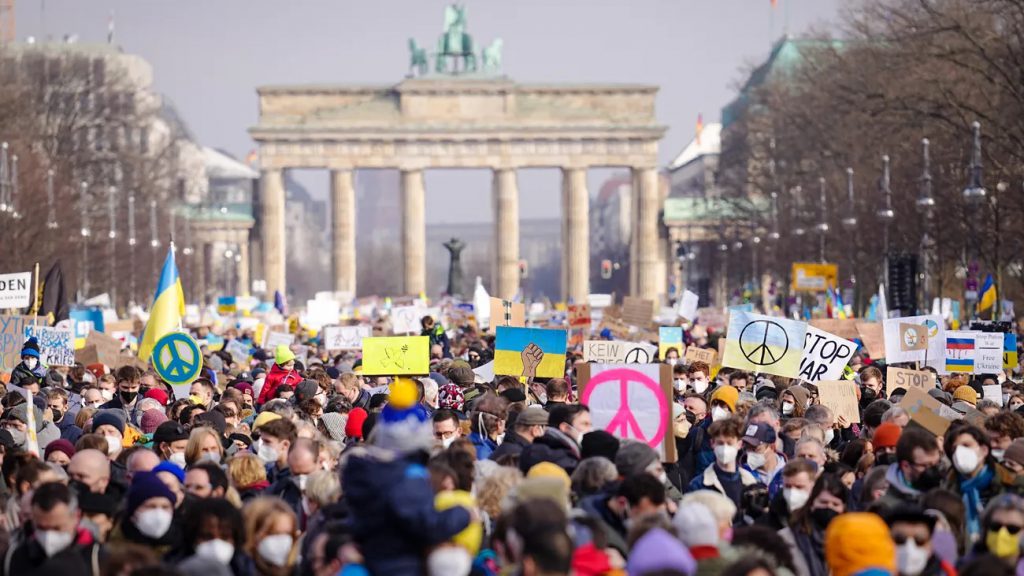
As some of our clients and partners may know, we have been working with permanent and freelance staff in Ukraine for years. Valued colleagues became friends with whom we have a lively exchange and were regularly in Berlin as a team (before this became difficult due to the Corona pandemic in the last two years). Service providers have become partners who support us actively and competently not only in the implementation but also in the planning of tasks and projects. We also maintain many close contacts with former employees. The country has grown very close to us over many, many years.
When the first news of Russia’s attack on Ukraine hit the ticker in the early morning of February 24, we were shocked and full of worry. We will not soon forget the next days (and even weeks), because it was a new experience in many ways. War in Europe, war against such close friends – who would have thought that possible?
An inconceivable crime
Well before the war broke out openly, we communicated a lot with our team about the situation, discussed dangers and potential risks, and coordinated possible measures. We offered everyone to come to Berlin and work from here at least temporarily or even permanently. The entire team had been in Berlin regularly over the last few years and thus already had a concrete option. However, many people declined and considered the Russian threatening gestures as a “bluff”. Almost no one really expected the situation to escalate so dramatically. When it did happen, it was unfortunately no longer possible for the guys in the team to leave the country.
For our customers, it is important to know that we were organizationally and technically prepared. Operations and development were and have never been at risk, especially since we also work with other developers and partners outside of Ukraine. The platform runs on a cloud-based system in Germany, which is not affected by this anyway. Responsibilities are distributed on different shoulders, so that necessary resources are always available for emergencies.
Nevertheless, we currently have to plan our development capacity a bit more agilely, but we are on target as far as the platform development goals are concerned. Thanks to the readiness of the team in Ukraine, we are already back to a “normal working process”. In the meantime, the majority of the team in western Ukraine has settled in as far as possible and is working from there at a normal pace.
Our concern is for the people, their fates, the safety and health of their families. That is why we want to report here – now with some distance – after four sad weeks of war.
In constant contact
On the morning of February 24, the situation was initially unclear. We were quickly in contact with most of our colleagues via chat, and their reactions varied. Some – also because they were prepared to a certain extent – set off in the direction of western Ukraine. Others first took care of their families and friends, wanted to stay and wait. All were shocked and could not believe what had happened, knowing what it would mean for their country.
The fact that the internet connection in Ukraine is still working well today means that we feel “close to it” here, getting feedback quickly, but also being able to share in the fears, news, perspectives and horror from the country itself. Moreover, one has to admit that continuing one’s own daily work under these conditions has not always been easy over the past four weeks.
Different conditions
It is necessary to know that we work with colleagues in different parts of Ukraine. Most of them come from Kharkiv or Zaporizhzhya, and while the situation in Zaporizhzhya has been reasonably calm and safe until today, it was quickly feared that the situation in Kharkiv would become critical. The city is located less than 30 km from the Russian border.
Two very valued colleagues stayed in Kharkiv for different reasons. One of them was worried about his own parents, he did not want to leave them alone and did not want them to travel across the country. A journey that was fraught with uncertainty from the very first days of the war. It was soon to be feared that the situation of these two would be of particular concern.
Luck in misfortune

On Sunday evening, Feb. 27, there was a long chat exchange with Victor, one of our software developers. He had stayed in Kharkiv with his girlfriend and friends. The next morning suddenly the news: he is in the hospital! A bomb hit next to his shelter and the broken window panes injured both his legs. He was taken to a hospital 30 km outside Kharkiv and operated on.
Fortunately, we quickly got the all-clear that he was fine under the circumstances. There will be no permanent damage. Already on Monday noon he sent us this photo with a short, humorous message. Victor is a very funny colleague, always up for a joke.
He is now in some safety in western Ukraine. He is doing better and we are currently planning his transfer to Berlin. He helps – besides his work, which he has actually already resumed – like many of his friends and colleagues, as much as he can with the support for people in Eastern Ukraine. And if there is time, of course, the software developers also participate in the cyber war against Russian websites and government agencies. In war, every developer also becomes a “hacker”.
By the way: Even the Berliner Morgenpost reported about our case and Victor. The M+ article is available here.
In great worries
At the moment there is only one colleague left in Kharkiv. However, we are very worried about him. He and his parents have spent most of their time in the basement of their home for almost three weeks now. The city is being bombed practically non-stop. The office from which he worked is completely destroyed.
His news is heartbreaking. Fortunately, he has stocked up early, but no one knows how long the shelling will continue. Ukrainians have no confidence in Russian escape corridors or regulations. There is a lack of medicine and every walk outside is life-threatening. The situation is absolutely terrible.
Our thoughts are with him, every day. And we hope very much that soon there will be a ceasefire, a resolution of this conflict. Especially in these regions, a humanitarian catastrophe has already begun.
Helping in Berlin
The worst thing for all of us was and is the helplessness, especially regarding the situation of our friend and colleague on Kharkiv. There is nothing left but to encourage him again and again when we chat with him – and we do that almost every day.
Therefore, it was quickly clear to us that we had to get involved quickly and intensively within the scope of our possibilities, especially here on the ground, in Berlin. The wave of solidarity and willingness to help is great, and not only in Berlin. Everyone is helping: Accommodation for families arriving in Berlin. Arranging apartments for a few days or for permanent stay. Contacts with other Ukrainians who help with translation. Friends of friends who spontaneously need help or advice.
This was and is a good way to contribute. And I think it’s foreseeable that the challenges there for us as a society are significant. Depending on how the war goes, experts say there could be up to 20 million refugees.
A spark of hope
Especially for our colleague in Kharkiv, we hope and pray for at least a timely ceasefire. A pause that will allow civilians to be evacuated and cared for. This is literally a matter of life and death.
No one would have thought that we would experience this so close to home. All the more it affects us all, when such a Europe-friendly, such an exciting country full of creative, educated, proud young people is attacked with the aim of de facto destroying it.
As I said, this does not change anything about the security, operation and further development of our platform. Of course, one or the other internal meeting, one or the other vote was “lost” in the last weeks. Often the thoughts were elsewhere, it was about internal exchange around the war and concrete questions how we can help. But we think that one should accept this in such times, must accept.
If you have any questions about the status and the situation, please feel free to contact us at any time. We will be happy to report further background. Otherwise, at the end there remains only the appeal to each individual to help the many war refugees (at the moment mainly women and children) where and how it is possible.